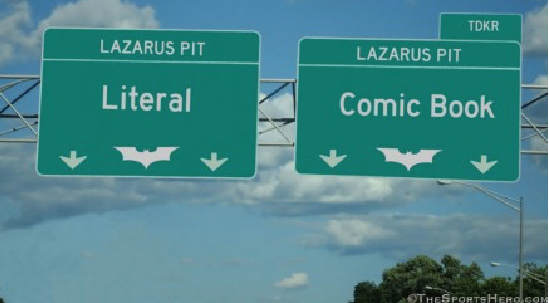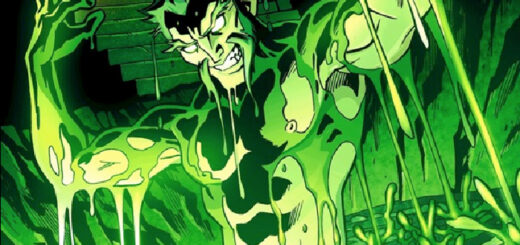Dennis O’Neil: The Pit and the Conundrum
When big pharma hears about the Lazarus Pit it will, of course, take out a patent on it and then… oh, maybe offer it as an option at upscale spas. Oh yeah, the wife and I both took a dip in the pit. Pretty pricey – 11 million and if you’re already dead double that – but boy! Way, way better than a massage…
The Pit, as far as I know, doesn’t really exist, at least not in our world. It’s a fictional apparatus that first appeared in Batman #233, back in the dark ages – we’re talking 1971 – and, like so much comic book material, has recently migrated to television, specifically to a Wednesday night program titled Arrow.
The Pit was originally the exclusive property of a 400-year-old scamp named Ra’s Al Ghul, who used it to restore himself when he was on the threshold of the Great Beyond, or maybe a half step past it. It fixed him up, all right, but he emerged from it a raving lunatic, an affliction that gradually abated.
There were conditions: it was strongly implied that The Pit could work its therapy only on Ra’s and that it was slowly losing potency – a time would come when it did nothing for Ra’s except maybe wrinkle his skin; it was highly toxic, so if anyone other than Ra’s dived in, kaput, the end, exit screaming; and it had to be situated over a certain kind of energy vortex – you couldn’t just dig one in the back yard if you wanted to one-up the neighbors and their puny swimming pool. Later, like all that lasts, The Pit evolved: it would only work once per person, and, most recently, The Pit can do its medicinal voodoo-hoodoo on someone who was good and truly dead – none of this sissy only-at-death’s-door bushwa.
Good storytelling demands that limitations exist if you’re working in a serial form and you want to run the bring-‘em-back-alive scam. The question naturally arises: why not just revive everybody who dies and – oops! – there goes conflict, suspense, maybe some other plot elements, doggone it. It’s the storyteller’s job to answer the question.
In a recent Arrow arc, the good guys used The Pit to revive one Sarah Lance, who’d been dead quite a while – maybe months. The Pit did its stuff, but Sarah didn’t recover her sanity until somebody realized that The Pit had taken her soul. The heroes’ team did some procedure, Sarah’s soul was restored, and off they went to another adventure.
The soul business gives me pause. What kind of soul – whose definition are we using? If by “soul” we mean some immaterial thing that lives within us, we suddenly face a version of philosophy’s old mind–body problem: if the soul is immaterial, how can material things – The Pit, for instance – act on it? And if it’s not immaterial… where is it?
Maybe I should ask my guardian angel and get back to you.
Ed Note: That awesome graphic atop this column is from, and is ©, The Sports Hero (All Rights Reserved, so watch your ass), “Where Sports & Comics Collide,” which is a wonderful concept.














